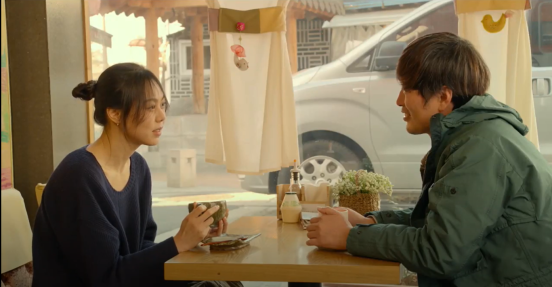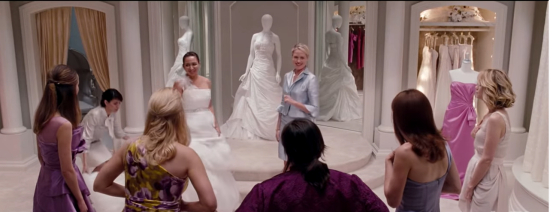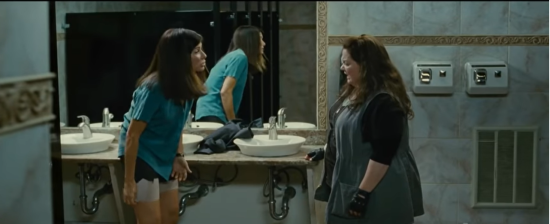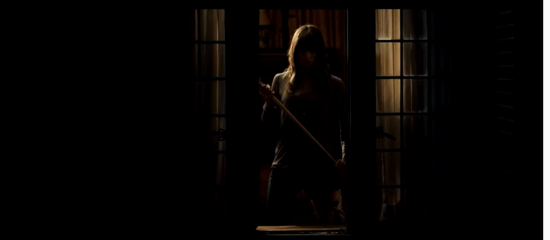Part of My Favorite Things: 100+ of my Favorite Movies Ever

Right Now, Wrong Then (2015), dir. Hong Sang-soo, starring Jung Jae-young and Kim Minhee
Have you ever been in a scenario, romantic or otherwise, where it was going well and then suddenly it turned sour? Then afterwards, you imagine how the same scenario would have played out if you just did something differently? It is absolutely my greatest vice to play what-ifs: to think about things that happened in the past, reconfigure the events, and perhaps change a few missteps, perceived or otherwise, until the right outcome happens. It’s a useless fantasy to dwell on the past for temporary comfort, and to think of what I could have done differently to make scenes right. Movies are often fantastic places to escape your troubles and project them onscreen. After all, movies can be described as an art of editing: cutting scenes, moving them around and rearranging them, and putting them together to make a scene work. Like a movie then, I have memories that I replay over and over, ever slightly tweaking them or rearranging them to get an outcome I desire. It’s a fleeting feeling, but nonetheless a comfort. Many of the movies on this list are my form of escapes and are often attached to a special memory, whether good or painful. This movie is the only one that dwells on the idea of what-ifs fully and the bittersweet melancholy that comes with playing that game.
Right Now, Wrong Then is Hong Sang-soo’s 17th film, his eighth of the decade. Hong is a prolific director who makes the same type of film that revolves around chance encounters between strangers, old friends, or old lovers. Oftentimes, his movies play the same scene again and again, while making slight adjustments that reverberate in other characters’ behaviors and actions. I think I’ve seen 11 of his 26 feature films and although most of them are similar, only a few of them resonate with me. Of all his films, this is his absolute loveliest. The movie is split in two, the first part is subtitled “Right Then, Wrong Now.” The film focuses on a movie director, Ham Chun-su (Jung Jae-young, standing in for Hong), who arrives a day early in Suwon for a screening and Q&A for his movie. At a beautiful shrine, he encounters Hee-jung (Kim Min-hee), an aspiring artist and sparks a conversation with her. They then go get coffee, continuing their friendly conversation before Hee-jung takes Chun-su to her studio. There, Chun-su watches her paint and offers some very flowery comments about her paintings. Hee-jung is visibly elated. After complimenting her paintings, the duo then gets sushi and soju, getting shitfaced (a staple of Hong films) while flirting with each other, before they head out to a birthday party for Hee-jung’s friend. That’s where shit hits the fan as Hee-jung’s friends openly call out Chun-su for his womanizing ways, his marriage and kids, and even the compliments that Chun-su paid Hee-jung on her paintings, which he has said in interviews before. This immediately deflates Hee-jung, who excuses herself to rest her head in a separate room. Chun-su tries to approach her, but she only rebuffs him and asks him to leave.
The first hour is an absolute delight. Hong is an incredible writer of conversations, capturing the awkwardness, the banality, and then the magical spark that lights up a budding relationship. During their first encounter at the temple, Hee-jung is so meek and shy, trying to avoid going beyond the polite chitchat with the stranger and sucking on her banana milk. Chun-su, on the other hand, is a little pushy, and since he’s narrating, we know he’s been spying on her earlier. It comes across as a little needy, but once he says his name, Hee-jung recognizes it and this thaws the ice between them a bit. From there, Chun-su asks her on a coffee break. This coffee date feels super natural: there’s an inherent tension between the two of them and Hong captures this brilliantly by panning from one person to the other during the conversation. We don’t really see how one is reacting to the other during the discussion until the camera moves onto them. Thus, it injects a little mystery in the scene: what are these two thinking? How are they calculating what to say and when to say it? It also is fundamentally different from the scene earlier where we see both characters split apart by the expanse of the shot, and yet we can see how their bodies and their faces react simultaneously to what the other character is saying. When we hit the art gallery, we focus on the director observing Hee-jung and offering some platitudes that can come across as empty-headed compliments were they targeted towards a more confident artist. But for Hee-jung, they come across as boost of confidence coming from a renowned artist, even though they’re talking about different mediums. Me being a pessimist listens to Chun-su’s comments and immediately thinks that he’s bullshitting. But because Hee-jung enjoys them so much, and Kim Min-hee radiates such warmth, it’s hard to remain a negative Nancy in the face of such grace.
Then the film cuts to the loveliest drunken date scene ever committed to film. Two things: a) I love watching people eat food in movies and I love sushi so watching people chow down on this is amazing! b) I’ve definitely been in drinking situations like this but I can only hope to look as blissed out as these two are when I’m shitfaced (knowing my history, probably can rule that out). Chun-su and Hee-jung flirting uninterruptedly (by either an edit or otherwise) is an absolute delight because you can practically smell the alcohol in the air and feel the warmth of these people’s faces, yet the chemistry between them seem so genuine and affectionate. These two trade lovely anecdotes and even get personal. The honesty pouring out of them is so intoxicating.
That’s why it’s absolutely earth-shattering to hear how phony Chun-su is from Hee-jung’s friends in the next scene. Being a famous director certainly got Hee-jung’s attention, but his fame also means his personal business is out there, including the fact that he’s married, a renowned womanizer, and has used the same compliments that he showered Hee-jung earlier to other people before. Watching Kim Min-hee’s face fall apart quietly is a thing of beauty. You can see her slump a little, the joy of the day fading away quickly. Again, who cannot relate to a scene like that? It’s like a page out of my sad diary.
This hour alone would have made for an excellent short-ish film, and one that feels complete. Yet Hong’s movies are never that simple. The next hour, subtitled “Wrong Then, Right Now” re-imagines the whole day like some sort of wish fulfillment. Whose wish, we don’t know (I want to think its hers, given how less naive she comes across here). Whereas the first hour had a splendid beginning, and a sucky ending, as the subtitle implies, this second hour has a rough beginning, and a surprisingly great ending. The movie starts again from the temple, although now it’s a different angle. Hee-jung is less open to conversation than earlier and Chun-su definitely comes across even pushier (verging on creepy, I think) by trying to spark a conversation with her. As he introduces himself as the film director, she lets her guard down a little although she’s even more cautious about getting coffee with him, going as far as to question him peeking into her plastic bags (that bit was funny). The coffee/tea date goes well, and in this version the camera has kept its distance the whole time, capturing simultaneous reactions and energies that were previously hidden. When they head to the studio, we now focus more on Hee-jung painting, watching her calibrate and think through what she’s going to do next to the image. Here, Chun-su offers a more nuanced take on her painting–passing judgment on her work and implying a lot more about her personal life than he should have any right to when you’re meeting someone for the first time. Hee-jung is noticeably upset, going as far as to scream at him for his infelicity. The tension in this scene is palpable–a bracing break from what we had expected. A smoke break clears the air a bit and the next thing you know they’re getting sushi and soju.
Like the first version, this drunken scene is spectacular in a different way. Whereas the first version feels more like a real first date, where people put up walls and don’t reveal personal details, especially unsavory ones, this second version seems like the kind of date everyone would want: all cards on the table, show your true selves. Here, Chun-su gets honest about being married, and having kids, and acknowledges his history of womanizing. Even the earlier argument over her painting leads to a sweet and honest discussion about Hee-jung’s lack of friends and the sadness that seem to emanate from her. It’s a more tender scene than the first version, and surprisingly funny as Chun-su tries to take a ring out to give Hee-jung. The night then shifts to Hee-jung’s friends’ party where Chun-su is met with kinder thoughts by her friends, even in comparison to his reputation. While Hee-jung goes to rest her head, Chun-su, who has now become drunk, starts stripping to the horror of Hee-jung’s friends. Hee-jung and Chun-su then leave together, with Chun-su walking Hee-jung home sweetly, and Hee-jung finding out about Chun-su stripdown utterly hilarious. The night ends super well, with Hee-jung kissing Chun-su on the cheek.
What I absolutely love about this movie, beyond the richness of its dialogue and the loveliest drinking scenes in history, is that underneath its diptych structure is a real engagement with honesty and how and when we learn information makes a difference in our reaction. In both versions, Hee-jung finds out that Chun-su is a womanizer, who is married with kids. Yet Hee-jung is more receptive about it in the second one than the first. Crucially, in the first version, she happens upon the truth from her friends, while the second comes straight from Chun-su. It doesn’t necessarily make what Chun-su is doing now better, but it certainly feels less painful to hear the truth from the source rather than second-hand, making Hee-jung less of a fool, especially since the confession came to her in private conversation than in a more public forum. The movie also engages with the notion of genuineness, about sharing how we truly feel rather than avoiding the mess of a possible confrontation. Chun-su’s empty compliments in the first version may have won Hee-jung over then, but it also led to Hee-jung’s feelings of betrayal at the end, whereas in the second version, Chun-su’s more nuanced critique led to a bruising confrontation which later facilitated a more open dialogue between the two. When the movie finished, however, I can’t help but to feel a tinge of sadness, knowing that the second version that we end on is a dream–the what-if scenario, instead of the actual reality for this two. It still ends with both of them going their separate ways, but it feels a tad melancholy in relation to the first one. After all, in both versions, they don’t go on to form a new relationship, but this one had a feeling of potential. Even the snow falling on the ground makes it all very wistful–like a distant cold memory.


